Introduction
The Defence value of respect is described as ‘The humanity of character to value others and treat them with dignity’ (Defence, Values and Behaviours). Where have you seen this value of respect demonstrated at its best?
ANZAC Day commemorates how the first ANZACs demonstrated to the world the military virtues of courage, teamwork and self-sacrifice. But one ANZAC talk reminded me we also remember with pride how the ANZACs added a few unique qualities that have become almost standard for the Australian digger: mateship and mutual trust, initiative and resourcefulness, discipline from earned respect rather than assumed worth, a tendency not to take ourselves too seriously (and the humour to remind one another not to let anyone get away with taking themselves too seriously), and an element of respect that we ought never to forget – a respect for the capability and courage of ally and foe alike.
Respect is a Defence value that safeguards human rights and dignity of everyone – including non-combatant citizens, enemy forces and POWs. When we fail to respect the humanity and dignity of others, we are tempted to dehumanise and mistreat others.
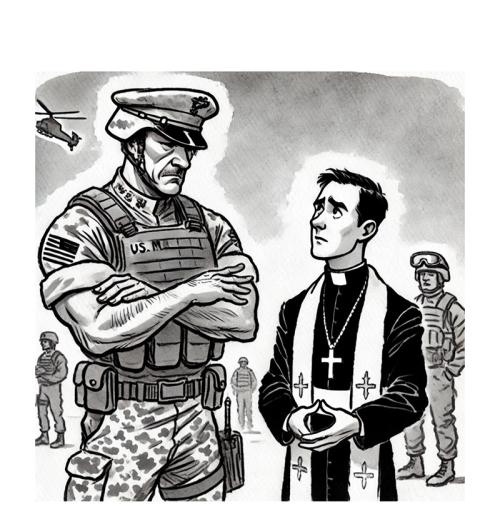
The cartoon above is a caution about not enjoying what is sometimes a last-resort-necessary-part of soldiering. ADF Careers have a dilemma in that they recruit people who are willing and able to be trained to use lethal force, but they avoid recruiting people looking for violence. The first sort of person are trained soldiers. The second sort are psychopaths – and there is no place in Defence for them. We must never set our respect for the dignity of other aside. We must never engage in or ignore behaviours such as mistreatment or torture of POWs, targeting or any cruelty to civilians, or any humanitarian breaches.

As Chief of Army in 2017, LT-GEN Angus Campbell stated: ‘When you are scared, exhausted, confused and your mates are dead, our weapons won’t discriminate the innocent from the enemy combatant – you will.’ This is what respect for the dignity of all brings to operational service. You can read the full article at Domestic violence—‘silence is the accomplice’, says Australia’s Chief of Army | The Strategist.
Respect is also critical within teams. We need to know that the mate beside us has our back when we need it, and that they can trust us to have theirs. We all bring different capabilities to Defence. But we also come from different backgrounds and yet need and rely on each other. Imagine how poorer we would be in Defence if we were all the same. Imagine what it would be like if Defence did not accept difference.
Have you heard of Alan Turing? He broke the Enigma Code in WWII, as shown in the movie The Imitation Game. He was a brilliant mathematician who brought this capability to the Allies at a critical time. He was also secretly gay and was criminalised for his sexuality, as foreshadowed in an early scene in the movie What if I don’t fancy her? (0:44).
I asked new diggers where they have seen and learned respect in Defence. They told me how they learn early the importance of respect towards the Chain of Command. We respect those who are senior to us when we salute. We respect those who have gone before us by marching on and honouring the parade ground, especially on ANZAC Day and Remembrance Day. We respect our nation when saluting the flag. Moreover, we respect the contribution of colleagues whatever their gender, sexual identity, age, cultural background, religious faith or lack thereof, political leaning or football code.
Respect ensures people we live and work with feel safe. As soldiers, we learn to use force appropriately, but we never use force at home. Family and Domestic Violence undermines respect for those we are supposed to love the most. With colleagues we may find attractive, we don’t cross the line with inappropriate suggestiveness or unwelcome sexual advances. Such harassment or abuse undermines respect and the right of colleagues to feel safe.
From my survey of learners in character training classes, it is interesting there are lots of subtle as well as obvious ways to show respect. We listen attentively and don’t talk over the top of people. We loop around after a run or gym circuit to join and finish with those finishing later. We respect different views and backgrounds and choices. We check up on sick mates. We honour those who are injured as still part of the team and not ever use unfair labels to suggest malingering. We respect the personal space of others in the gym and lines. We treat others the way we want to be treated. We show respect with manners, discipline, kindness, volunteering for tasks, appropriately pointing out things that need correction, and playing our part on the team – not slacking off and leaving duties to others.
When respect is part of our team culture, we will be open to learn from one another. The ADF Leadership doctrine also has an important point about when respect is earned:
Respect produces a humility that is not about timidly devaluing ourselves, but honouring the team for all that our differences bring.
Meditation exercise #1: What does the Defence value of respect mean to you and where have you seen it embodied and lived out at its best?
Historical inspiration – LTCOL Ralph Honner DCO MC at Kokoda
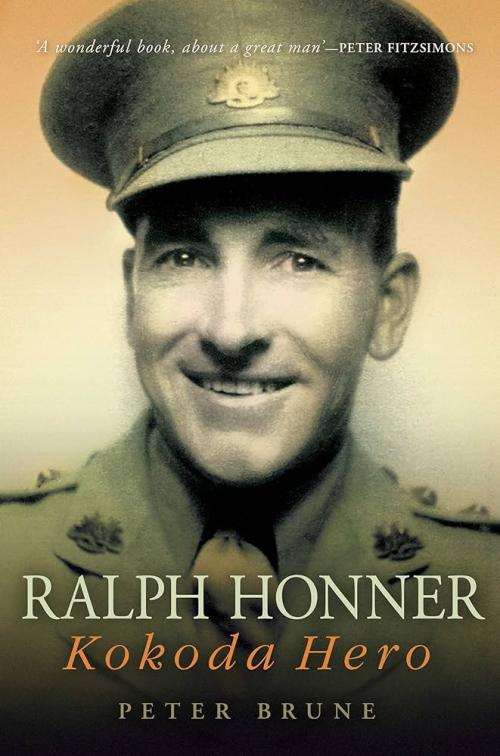
An inspiring episode of respect was demonstrated by LTCOL Ralph ‘Jump’ Honner DCO MC at Kokoda. See the 2006 movie Kokoda or Ralph Honner: Kokoda Hero. The 39th Battalion (comprising mostly national servicemen – Chocos – with little formal military training) deployed to Moresby for garrison duty and work parties. Then they were directed up the Kokoda Track to halt any Japanese advance. COVE’s video ‘Australia’s Kokoda Campaign’ shows the battlefield’s progression. One of the fiercest exchanges was at the Battle of Isurava. The courage of the choco diggers is inspiring. But so too is the respect expressed in the CO’s address after their stand at Menari village on 6th Sep 1942:
Now I don’t know a lot of you by name, but I know you.
We met at Isurava. We fought there together and every step of the way here.
Now we are relieved and we will leave the battle.
And every day the enemy supply line stretches further. He suffers now as you have suffered.
The battle we fought for the track may have just saved your nation. At Imita we will stop him.
Brigadier wants you to know…your gallantry, your courage, your fortitude are an inspiration.
And I want you to know that you are some of the finest soldiers that I have ever seen.
You have seen things in this place that no man should witness.
Some of these things you must forget. But history will remember you, and in the years to come others will wish that they had your conviction.
And remember…remember the glory is not the exhortation of war, but the exhortation of man.
Man’s nobility, made transcendent in the fiery crucible of war.
Faithfulness and fortitude.
Gentleness and compassion.
I am honoured to be your brother.
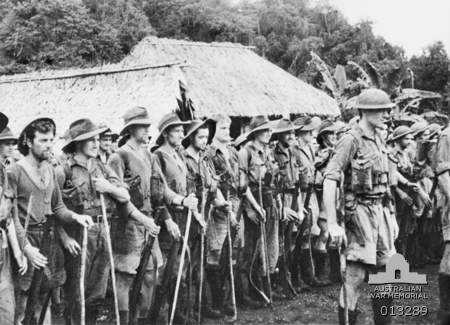
LTCOL Honner’s respect for his troops bolstered morale and he also strategically utilised combined artillery support and a strategic fighting withdrawal against overwhelming numbers. Honner brought out the best in his troops, later commenting on the importance of respect for one another:
The Kokoda story also has lessons for respecting local people – certainly the debt Aussie diggers feel towards Papuans, nicknamed with the then respectful though now socially outdated term Fuzzy Wuzzy Angels, who served as carriers and scouts is legendary.
In return for his respect, LTCOL Honner was shown respect by his own troops, and by the Japanese. At his funeral, a Japanese veteran attended unannounced, approached the coffin, bowed stiffly in respect, and bowed again as he gave a letter of condolence to Honner’s family.
Meditation exercise #2: Where do you see the Defence value of respect in the actions of LTCOL Honner? Where do you see similar respect in other historical Defence stories?
Contemporary heroes – COL Tim Collins OBE
Colonel Tim Collins OBE gave a rousing eve-of-battle speech as CO to 1st Battalion, Royal Irish Regiment in Kuwait in 2003 before they crossed the Iraq border. His words were off-the-cuff but recorded by a journalist, reproduced by an actor in this video.
‘Col Tim Collins’ Eve of War Speech’ (3:31)
Meditation exercise #3: How could you and your team develop a similar posture of respect in your teamwork? How would his attitude influence how you might serve on operations in contexts different to Iraq?
Movie illustration – Remember the Titans
Movies can powerfully inspire values-based character (see COVE’s Positive Psychology at the Movies). For a terrific movie scene that illustrates respect between different social and cultural groups watch the development of teamwork in ‘Remember the Titans – From Division to Team’ (4:46) (best viewed off the DPN):
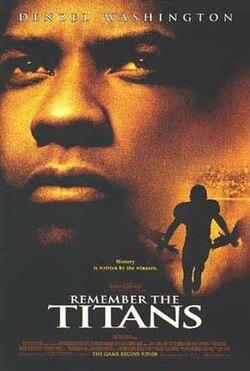
Meditation exercise #4 What can Defence members learn about the value of respect from this scene?
Meditation exercise #5 What other movies and scenes best illustrate and inspire respect for you?
Scenario – Prostitution
Imagine yourself in this scene and discuss your responses. (This is a scenario Chaplains developed at ADFA’s Character Mentoring Cell.)
Imagine you are a Private that serving on an Operation in East Timor. Your section is stationed in a small compound in a village and the rotation is for a two-week period. Towards the end of your rotation, you are on sentry with another member of your section at about 2200h, when your section commander comes up to the gate and brings into the compound a lady who you know to have been the local comfort girl for the Indonesian troops, when they occupied the area nine months prior. Your section commander and two other members of the section are currently escorting the lady towards the building that is used to house stores and supplies. When you look at the other soldier on sentry with you, he just smiles, shrugs his shoulders and looks away.
Meditation exercise #6: What actions would you take in this situation? In what ways can Defence values inform your response?
A – You stay put and continue to scan your arcs – no further action
B – You go over and challenge the patrol commander as to what he is doing
C – You wait to the end of the patrol and then report the incident through the chain of command.
D – Propose another alternative: __________________________________________.
Reflection exercise – respect reps & sets
Defence values and respect are not taught in a classroom but learned in practice. This exercise is about having ‘reps and sets’ that can helps to build your character and respect muscle memory. As a drill over the coming day, when you are faced with a decision, ask yourself:
‘What will I as a person of character guided by RESPECT do here?’
Take a mental note of how the Defence value of respect guided your actions, note it in your journal and/or be prepared to discuss your lesson with your team.
If you have further time, you could start discussing this question now and/or leave it till another session for review:
Meditation exercise #7: In what ways have you recently been guided by the Defence value of respect?
Other activities
If you are interested in another scene that illustrates the Defence value of respect, watch and discuss: ‘A Few Good Men (1992) - The Verdict | Officer on Deck Scene’ (4:08).
If interested in growing in understanding and respect for members who are different follow the link to some SBS inclusion courses on First Nations, LGBTIQ+, gender, disability, culture, and generations at the Forge’s ‘Beyond PC to Authentic Respect: Review of SBS Inclusion courses’.
To learn more of Alan Turing’s codebreaking and his personal life watch Alan Turing - Beyond the Code: Celebrating LGBT+ History Month (2:06).
If you enjoyed this activity, why not try other Learning Packages on Service Courage, Integrity or Excellence in the Forge, or an introductory Quick Military Education (QME) session on ADF Values or other QMEs available on The Cove?
Comments
If you have suggestions for improvements – other readings, scenarios, movies, discussion points, delivery methods, or if you have seen this value embodied by someone – or if you just want to provide feedback, please login to comment.
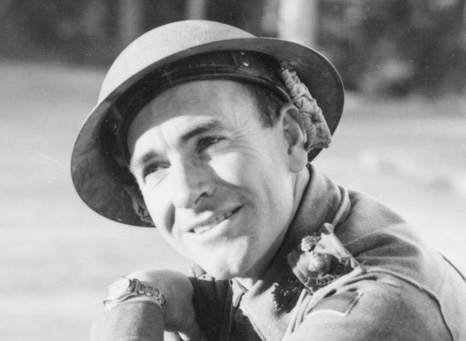
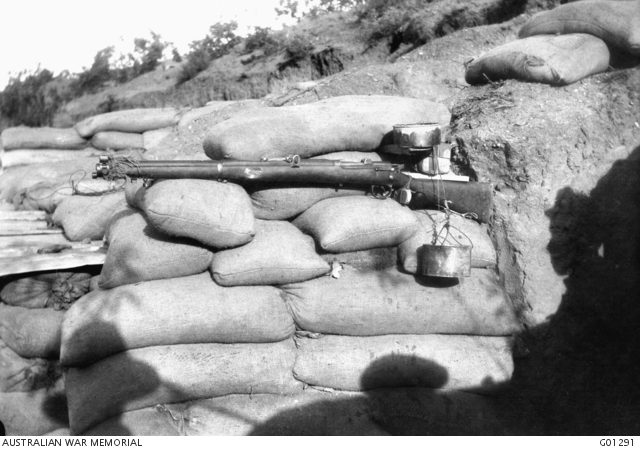

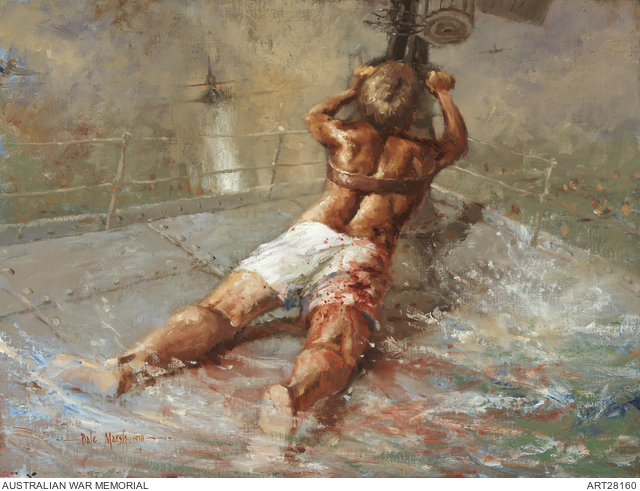

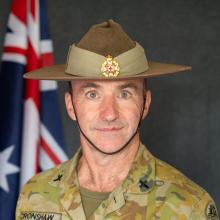
Comments
Start the conversation by sharing your thoughts! Please login to comment. If you don't yet have an account registration is quick and easy.